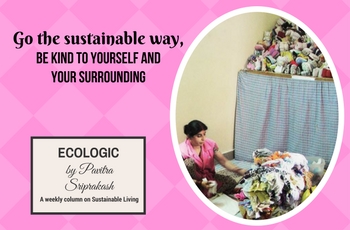22 Jul 2017, New Indian Express: ECOLOGIC- Pavitra Sriprakash, the Chief Designer and Director of Shilpa Architects writes about Sustainable Menstruation.
Full Article:
Go the sustainable way, be kind to yourself and your surrounding
“Akka,” exclaimed the innocent girl along the ECR, “it doesn’t look like biscuits!” She responded so when volunteers handed her a packet of sanitary pads along with a food box during the Chennai floods. More and more women are now being influenced to switch to sanitary napkins. Although convenient and hygienic, their disposal challenges sustainable general health and our environment.
The GST law has reduced tax on menstruation related products to 12%. Amidst all the hullabaloo of a new tax regime, debates on sanitation, sustainability and obscure taboos rage. Many protest demanding the tax be waived to promote clean and safe practices among women. Others hail their inclusion in the 12% slab instead of the 14.5% tax it attracted before. Hopefully it will make those products more affordable now. However the unanswered questions are about how to educate the rural poor about adverse health effects of age old practices and make sustainable modern alternatives readily available.
Fields and streets in small towns choke with used sanitary napkins. We rely on municipal corporations to cart away soiled pads, tampons and diapers. Citizens are generally ignorant of the impact of sanitary napkins on the environment; unfortunately this is not bliss! They are usually made from super-absorbent polymers, polyethylene films, glue, LLDPE–packing covers, thermo-bonded non-woven release paper and wood pulp. Petroleum based synthetic materials take centuries to degrade.
Plastics produce dioxins when callously burnt in open dumps leading to cancer and causing respiratory issues among people. Closed incineration to strict international emission standards is the only way to handle the biohazard safely. Sadly we lack solid waste management processes and systems that deal with these types of ‘disposables’.
The much touted 2011 survey by AC Nielsen found that hardly 12% of 355 million menstruating Indian women used a pad. It showed that 432 million bloodied pads were thrown away every month which would have then been enough to cover over 24 hectares of landfill. The Guardian claims that “nearly 90% of Indian women don’t use sanitary pads.” According to WaterAid, “for the absorption of menstrual blood, 89% use cloth, 2% cotton wool, 7% sanitary pads and 2% ash”.
Young girls often grow up with limited knowledge of menstruation because their mothers and other women shy away from discussing the issue with them. The urban poor surreptitiously wash the same cloth and suffer ignominy while it dries in congested shanties before reuse. According to a study, nearly 97% of gynecologists believe that sanitary napkins sharply reduce the risk of severe Reproductive Tract Infections. Unfortunately cheap imports irritate the skin because they contain harmful chemicals and allergens. The logic to make the switch from traditional sanitary products to alternate sustainable options is still compelling.
There are several sources in the internet. Many health initiatives by governments and NGOs are at hand to educate and enable women make the transition to cheaper cup or cloth, which are compostable options. So, use the GST to learn or teach the less privileged about the need and availability of sustainable sanitary products, for greater personal well being and a cleaner planet – PERIOD!



